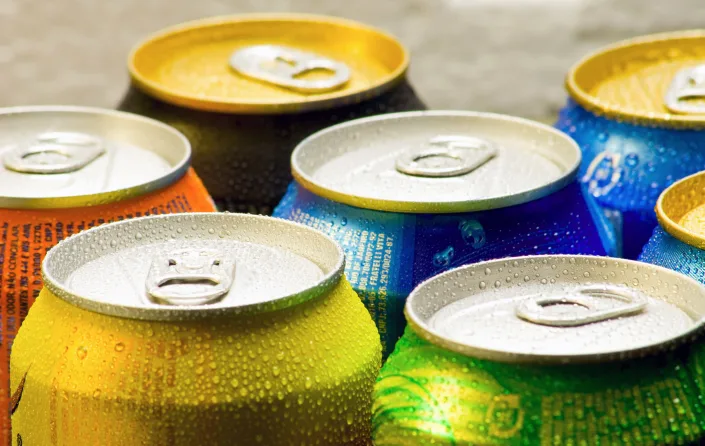 Consuming two or more servings of sugary drinks a day may raise the risk of dying from an obesity-related cancer, a new study finds.
Consuming two or more servings of sugary drinks a day may raise the risk of dying from an obesity-related cancer, a new study finds.
An analysis of data from nearly 1 million Americans who were followed for almost 30 years reveals that people who consumed sugary beverages had a 5% increase in the risk of dying from an obesity-related cancer when compared to people who consumed no sugary drinks.
Those who consumed two sugary beverages a day were also at a 9% increased risk of dying from colorectal cancer and a 17% increased risk of dying from kidney cancer when compared to people who drank no sugary beverages, according to the report published in Cancer Epidemiology, Biomarkers and Prevention.
“This study provides more evidence to support recommendations to cut back on sugary drinks,” said the study’s first author, Marji McCullough, senior scientific director of epidemiology research at the American Cancer Society in Atlanta. “When we put BMI into the model, the 5% increase was no longer statistically significant, suggesting, at least in part, that this finding is mediated by excess body weight.”
As for the increased risk of dying from colon and kidney cancers, which remained statistically significant even after BMI was accounted for, “we don’t know exactly why that is,” McCullough said.
The study also found that consumption of a similar amount of artificially sweetened drinks was associated with an 11% increase in the risk of pancreatic cancer even when BMI was accounted for. “That was a novel finding,” McCullough said. “But this is the one study that found a higher risk of pancreatic cancer and it should be replicated in follow-up studies.”
It’s possible that the increased risk among those who consumed artificially sweetened drinks could be explained by other factors, McCullough said, such as diabetes. “Diabetes is a risk factor for pancreatic cancer and people with diabetes do drink more artificially sweetened drinks.”
To take a closer look at the impact of sugary drinks on the risk of cancer mortality, McCullough and her colleagues turned to a data set collected by the American Cancer Society, which in 1982 enrolled 1,184,284 men and women aged 28 and older in the Cancer Prevention Study II (CPS-II).
For their analysis, the researchers focused on the 934,777 participants in the CPS-II who did not have cancer or diabetes at the outset and for whom there was complete data. The researchers excluded male participants who were older than 90 and women who were older than 95 when they enrolled in the study.
During the course of the 27.7 years of follow-up, 135,093 of the participants died from cancer, which amounted to 25.9% of all deaths in the group.
“Sugar is everywhere in our diet,” said Dr. David Heber, a professor of medicine and public health at the University of California, Los Angeles and founding director of the UCLA Center for Human Nutrition. “That’s because food manufacturers know sugar sells products everywhere from ketchup to hamburger buns.”
And 33% of the sugar American’s consume is from sugary drinks, said Heber, who was not involved in the new research. Those drinks can have a huge impact, he added.
“An 8 ounce cola contains 37 g of sugar and the blood stream can carry only a limited amount of sugar, about 5 g,” Heber said. “The excess sugar is transported to the liver where it is turned into fat or is transported to the muscles where it’s burned during exercise. Fat is an inflammatory organ that can help promote cancers in both men and women.”
Heber suspects that the connection between sugary drinks and colon cancer may have something to do with the impact of sugar on the microbiome. As for the kidneys, when they are filtering a lot of sugar, that may have an adverse effect, Heber said.
Dr. Emanuela Taioli suspects that the association seen between artificially sweetened drinks and pancreatic cancer may be related to the fact that many people switch to these beverages after they are already obese.
“So this may be a reverse effect,” said Taioli, director of the Institute for Translational Epidemiology and associate director for population science at the Tisch Cancer Institute at the Mount Sinai Health System. “It is a much more complicated story when you’re looking at artificially sweetened drinks.”
Taioli worries about all the children who were exposed in school to sugary drinks from vending machines. For many, that may be where the taste for sweet drinks starts, she said.
Visit cpe bag homepage for more details.
The diet of Americans has changed a lot since the beginning of CPS-II, said Linda Van Horn, a professor of preventive medicine and chief of the nutrition division at Northwestern University’s Feinberg School of Medicine.
“I think, frankly, the most important thing identified here, which has been pointed out before, is the adverse relationship between any type of cancer and the development of obesity,” Van Horn said. “Keep in mind, the vast majority of us are overweight or obese.”
Ultimately, the findings point to the importance of primary prevention of obesity, Van Horn said. “I tend to focus on maternal-fetal medicine and pediatrics,” she added. “We have the opportunity to start with young people in terms of primary prevention. We know that once a child starts on a trajectory of weight gain they are at the greatest risk of becoming overweight or obese.”
Comments
No comments yet. Be the first to react!